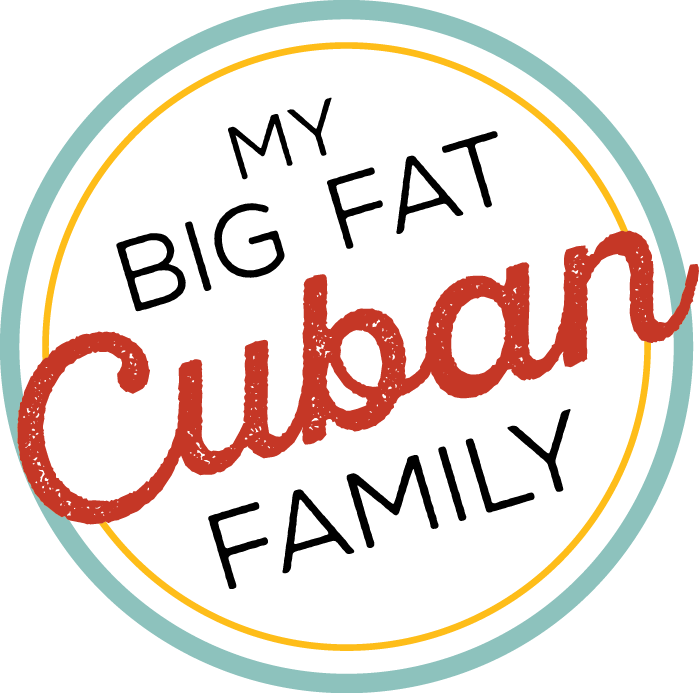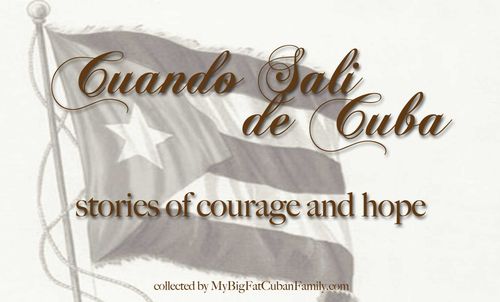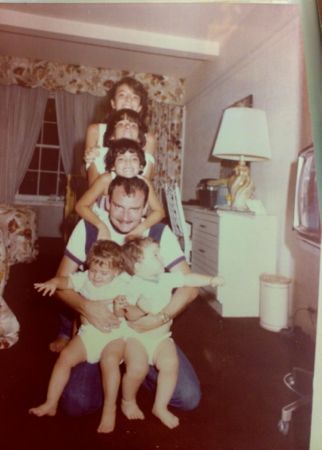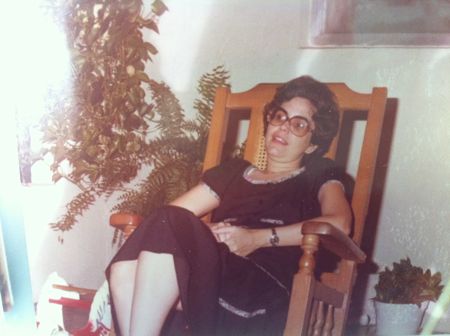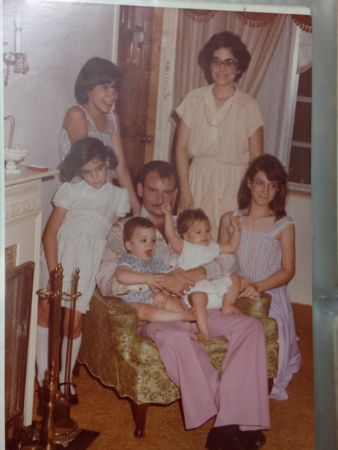Cuando Sali de Cuba - Elena's Story
/Marta here: Most Cubans are familiar with Santayana Jewelers. They are a mainstay of the Cuban exile community in Miami. I'm delighted that Elena Santayana has graciously agreed to share her family's stories. Her memories of growing up Santayana are both hilarious and poignant.
(Translations to her Cubanisms are marked with a red * and are at the bottom of the story.)
Gracias, Elena. You humble me.
I was born en la saguesera. That’s the southwest area of Miami, on June 8, 1978. I have three sisters, Marisa, Miriam and Patty and a twin brother, Rudy. We grew up in a split plan home in the beautiful Westchester area of Miami, Florida.
Santayana loved taking totem-pole pictures.
Both of my parents came to this country alone. My dad, known as Santayana, was Peter Pan (pronounced with rolling r’s). I thought that meant he wore green tights and fought pirates. Later, I learned it meant he came to this country without his parents and stayed at a home for boys until a cousin or uncle picked him and his brother up. But I never really “got it” until quite recently. When I was 17 years old and in high school, I never took a moment to imagine, “What if right now, I was sent away to live in another country, indefinitely, with little money and alone?”
Mom arrived in the United States on the Freedom Flights. In 1961, the day before Halloween, she was supposed to board a plane with her brother and sisters but there was a problem with her visa and she was made to stay an extra couple of days in Havana. She was 17 years old and didn’t speak much english. She lived in a house with 12 other people in the northwest area of Miami or, as she says, “la casa del nor’wes’ ”.
Elena's mama. The original hipster.
My father, Santayana, was a hard working man. Every morning he would dress in a fine suit and take his maleta* of jewelry to visit clients at their homes. Before he opened the jewelry stores, my dad was known for his maleta. I still hear stories of people who remember my dad showing up at their house, opening his maleta and revealing tray after tray of sparkling jewelry.
In the 80’s my dad had three really cool things in his possession. Number one, Santayana owned a beeper. Not the beeping kind we know now, the kind doctors still use. Dad’s beeper was like the speaker at KMart. Here’s how it worked:
- Step 1: Call the beeper.
- Step 2: Wait for the tone.
- Step 3: Convey the message for all to hear over the speaker/beeper strapped to his belt. Twice.
The messages were to be coded at all times so that random strangers on the street wouldn’t suspect he was carrying a maleta of jewelry and give him the proverbial, “Palo por la cabeza.*”
An example of an acceptable message would be: “Santayana, llama la tienda. Santayana, llama la tienda.*”
However, if you said, “Santayana llama la joyeria.*” - that got you in big time trouble. Similarly, if you said, “Papi llama a mami,*” you would get banned from beeper detail. Singing Happy Birthday into the beeper was also not warmly received.
Second, Santayana had a car phone. His car phone was super cool, space-age stuff. Imagine a rotary phone bolted to the center consul of his wine colored Caprice Classic. The advanced car phone technology also required the Caprice to sport a subtle, 6 foot long antennae on its roof. Phone calls were ridiculously expensive but dad was a gadget man and had to have it. No one had a car phone.
Well, some people had carphones - drug dealers. In third grade some kid asked me, “Is your dad a drug dealer? Why does he have a car phone?” We’re talking about Miami in the 80’s, this kid was not asking an illogical question. So I told him, “Noooo, my dad is not a drug dealer, he’s a jeweler.”
The third, neato thing Santayana had in the 80’s was a beautiful, brand-new, wine-colored Caprice Classic. On the rare occasion that Santayana took me and Rudy to school, he would pretend that his car was an airplane; he was the captain and we were his crew. I was the flight attendant offering peanuts and Rudy was the mechanic. There was always something wrong with the plane and we would have to rush, rush, rush to fix the problem. This game probably explains my fear of flying.
Although it had been over 20 years since our parents’ flight from Cuba, growing up in the 80’s, we were raised to believe that our residence in Miami was temporary. Every Christmas Eve someone proclaimed, “El año que viene en Cuba!*” Then everyone would toast and cheer and give each other big hugs.
The Santayana Family. Circa 1980.
My uncle Marcelo, who exiled to the Canary Islands after serving 9 years in a Cuban prison, had a really short index finger. His index finger was literally shorter than his pinky. Don’t imagine that his finger didn’t have a nail. It totally did. The whole thing was intact, it was just short. Like a baby finger. As a kid, that finger was the freakiest thing I had ever seen.
He waved that finger around like there was nothing wrong with it. I once asked him about it, he loudly proclaimed, “Porque este año, este año cae Fidel!*” while slamming the tip of his freakishly short index finger on the table. I totally believed him. I mean, it made sense to me that slamming that finger down every day for the past 20 years would make it a whole phalanx shorter.
Every year was the year Fidel was going down. Every Christmas we were spending the next one in Camaguey. I worried about what I should pack in my luggage. Should I take a bathing suit, a sweater, boots? Should I start packing today? Was there going to be horseback riding? Whose house would we be staying at? How would Santa know where to leave the presents? It was all very confusing.
Elena's Mom (far left) with 8 of her 11 siblings. Tio Marcelo (not pictured) died this year, 2012, on her dad's birthday.
In 2007, my father was diagnosed with a horrible form of cancer. One night, as I was sitting with him at the hospital, it came over the TV that maybe Fidel Castro was dead. I wondered to myself, “Do I wish death on Castro now?” I wasn’t sure if I wanted Castro to be dead just then because my father was, at the time, on his own death bed. On this night, facing the uncertainty of my father’s life, I wasn’t sure I could wish death upon anyone. Not even on the person who had caused so much misery to thousands of people.
I also did not want my dad to live in a world where Castro was finally dead. The one reason he had not visited his childhood country after all these many years was the fact that Fidel Castro was alive, and finally, right when it was too late, the son-of-a-bitch up and dies? I didn’t know what to do. So I did the first thing that came to mind, I went to La Carreta.
I have celebrated many major life changing events at La Carreta. I sounded the horn of mom’s minivan from our house all the way to La Carreta both times the Florida Marlins won the World Series. I made sure to find parking far and early both times the Heat won the Playoffs because getting there late meant being stuck in traffic. Once, the day after Halloween, my friends and I dressed up in costumes and strutted our stuff carrying a boom box from the entrance, all the way to the back, then right out the front door. But this night, the night we thought Castro was dead was different. The energy in the air was celebratory, but nostalgic. It was both happy and sad. And I watched, completely covered in goosebumps, as a group of 20 or so teary individuals sang and danced in unison to Willy Chirino’s “Ya Viene Llegando” (video below) until the police came and broke up the entire party.
I don’t have to tell you, but I will anyway, Fidel Castro was not dead that night. Nor has he been dead any night since. My dad wasn’t happy I danced in the streets. He didn’t want me to go La Carreta to celebrate that man’s death. He didn’t want to be duped by the Castro regime. But I wanted to pass the joy in my heart to my dad. The joy I felt from being his daughter and the immense sense of pride I feel of being Cuban.
A few days or maybe weeks later my father passed away. He died in a world where Fidel Castro lived, his beloved Cuba, still existing under the foot of a tyrant. But, in the end, the only thing that ever truly mattered to him was his family. When my dad died I understood, for the first time ever, what Cuban nostalgia was really all about.
* Translation of terms used in Elena's story:
- Maleta - suitcase.
- Palo por la cabeza. - Blow to the head with a large blunt object.
- Santayana, llama la tienda. - Santayana, call the store.
- Santayana llama la joyeria. Santayana, call the jewelry store
- Papi llama a mami. - Dad, call mom.
- El año que viene en Cuba! - Next year in Cuba!
- Porque este año, este año caie Fidel! - Because this year, Fidel will fall!
